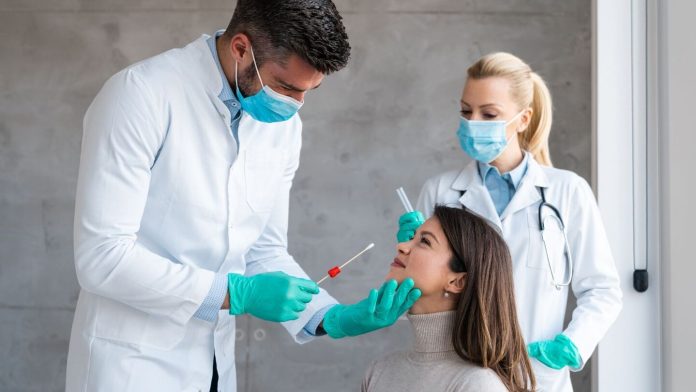A polymerase chain reaction is abbreviated as PCR. It’s a test for genetic material from a specific organism, such as a virus. The test will detect the presence of a virus if you have one at the trial. Even if you haven’t been sick in a long time, the examination may discover virus remnants.
A COVID-19 PCR test is used to determine the presence of the virus COVID-19.
The COVID-19 polymerase chain reaction (PCR) test looks for SARS-CoV-2, the virus that causes COVID-19, genetic material (ribonucleic acid or RNA) in your upper respiratory specimen. Using the cheapest PCR test in Dubai technology, little amounts of RNA from samples are amplified into deoxyribonucleic acid (DNA), which is replicated until SARS-CoV-2 is detected if present. The PCR test has been the gold standard for diagnosing COVID-19 since its approval in February 2020. It’s accurate and dependable.
The folks mentioned below should be tested for COVID-19.
Your healthcare provider may recommend COVID-19 testing if you have any of the following symptoms:
- Fever or chills
- You’re coughing.
- Breathing difficulties or shortness of breath.
- Tiredness.
- Muscle pain as well as aches all over the body.
- You’re experiencing a headache.
- There has been a recent loss of flavor or odor.
- You have an itchy throat.
- Coughing and a runny nose are signs of a cold.
- Nausea or vomiting
Diarrhea is a chronic ailment.
COVID-19 affects various people in different ways. Not everyone who is sick shows all of the signs and symptoms listed here. Even if you’ve been vaccinated, see your doctor if you get sick during the COVID-19 pandemic.
There are three phases to the COVID-19 PCR test:
A swab is used to collect respiratory debris discovered in your nose by a healthcare expert. A swab, a long, flexible stick with a soft tip, is used to wipe the inside of your nose. Nasal swabs and nasopharyngeal swabs are the two types of nose swabs. Nasal swabs collect a sample from your nostrils, whereas nasopharyngeal swabs collect a sample from further within the nasal cavity. Any swab can be used to gather models for the COVID-19 PCR test in Dubai. After collection, the swab is sealed in a tube and delivered to a laboratory.
The genetic material is isolated from the rest of the sample’s contents when a lab scientist receives it (extracted).
After that, the PCR process is used, which requires the use of specific chemicals and enzymes as well as a thermal cycler PCR machine. With each heating and cooling cycle, the amount of targeted genetic material in the test tube increases (amplifies). The test tube contains millions of copies of a small piece of the SARS-CoV-2 virus’s genetic material after numerous processes. One of the chemicals in the tube creates a fluorescent light if SARS-CoV-2 is present in the sample. Once the signal has been amplified sufficiently, the PCR at home Dubai equipment can detect it. Using special software, scientists interpret the signal as a positive test result.
What does a COVID-19 PCR test result mean?
If you have a positive test result, you are most likely infected with SARS-CoV-2. This could be the result of a disease with no symptoms. COVID-19 is the name of the infection if you acquire symptoms. The majority of people have minor illnesses that can be treated at home without the need for medical attention. If your symptoms worsen or you have any questions or concerns, contact your healthcare provider.
A negative test result means you were not infected with SARS-CoV-2 at the time your samples were taken. COVID-19 can exist without the virus being detected by the test. If you’ve been infected but haven’t displayed symptoms yet, or if you’ve had COVID-19 for more than a week before getting tested, this could happen. A negative test does not guarantee long-term immunity; you could be exposed to COVID-19 after your trial, become ill, and infect others with the SARS-Cov-2 virus.
If your test results are positive, contact your doctor immediately and remain at home to avoid being seen by others. Even if you get a negative COVID-19 test, you should continue to protect yourself and others against infection. Learn what to do if you test positive for COVID-19 and how to prevent infection.
Within 24 hours of collecting your sample, you should receive your test results. However, depending on how quickly the sample arrives to the laboratory, it could take a few days.
How long does it take you to find out whether you’ve tested positive for COVID-19?
The sensitivity of the PCR test allows it to detect very small amounts of viral material. This shows that even after you’ve recovered from COVID-19 and are no longer contagious, the test can detect SARS-CoV-2 viral pieces. Even if you can’t spread the SARS-CoV-2 virus to others, if you’ve had COVID-19 before, you may continue to test positive.
Long-term infection in immunocompromised persons might result in viral transmission spanning months. Furthermore, even healthy people can become infected again. Please see your doctor if you test positive for SARS-CoV-2 but think you’ve recovered from COVID-19.
What’s the difference between PCR and antigen tests for COVID-19?
The polymerase chain reaction (PCR). This test checks for the presence of genetic material or fragments as the virus breaks down. For detecting current infection, PCR is the most reliable and accurate diagnosis available. While most PCR tests take several hours to conduct, some can be finished in less time.
Antigens on the virus’s surface, as well as protein fragments, are detected by the antigen test. Antigen tests normally take 15 to 30 minutes to complete. When provided within a few days of symptoms, when the virus is at its peak concentration in your body, rapid antigen tests are the most accurate.
What is the most reliable COVID test?
Antigen tests are generally faster than PCR tests. However, they are less sensitive. Because antigen tests are not as accurate as PCR, your healthcare professional may recommend a PCR test at home in Dubai to confirm the negative antigen test result.

What’s the most efficient way to find out where I can get COVID-19 tested?
If you have COVID-19 symptoms or have been exposed to someone who has symptoms or has tested positive, you should be tested. Before you do anything, talk to your doctor. Your symptoms will be discussed with you in person or via video chat. The doctor may order a test and aid you in finding a testing center and time if necessary. Call beforehand to make sure the testing facility can accommodate you if you’ve been exposed to the SARS-CoV-2 virus but haven’t displayed symptoms.
You can also contact or look up nearby hospitals in your health insurance network, as well as community health clinics or urgent care centers, on their websites. The US Department of Health and Human Services website has links to community-based testing centers in your state. Go to the websites of your state or local health agency for the most up-to-date information on testing locations. The Centers for Disease Control and Prevention maintains a list of state and municipal health departments.
The following is a statement from Royal Premiere Healthcare Center:
By adopting precise and early diagnostics, COVID-19 spread can be slowed. If you begin to have symptoms, consult your doctor or your local public health authority to be tested. You can rely on your doctor to offer you with the most practical and trustworthy test available. To protect individuals around you, wear a face mask that fits snugly over your nose, mouth, and chin, and avoid close contact with people until you receive the results of your COVID test. Keep an eye on your symptoms and get medical attention if you experience any of the following:
- Breathing difficulties
- Persistent chest pain or pressure.
- Unprecedented levels of perplexity have been reached.
- Difficulty waking up or staying awake.
- Blue lips or a blue face.

To summarize,
The doctor on call program’s main goal is to provide a first diagnosis and, if necessary, test prescriptions. In the comfort of your own home, the service seeks to provide primary healthcare, after-care medical support, and health management. The Doctor on Call service is a godsend in situations where time is of the essence.
With its Doctor on Call service in Dubai, Royal Premiere Healthcare identifies and responds to individuals’ medical requirements. If you require Royal Premier Healthcare’s Doctor on Call services in Dubai or any medical support, please call +971 4 244 7574 or send us a message on WhatsApp at +971 50 357 1916. As soon as possible, one of our committed staff members will contact you.



















